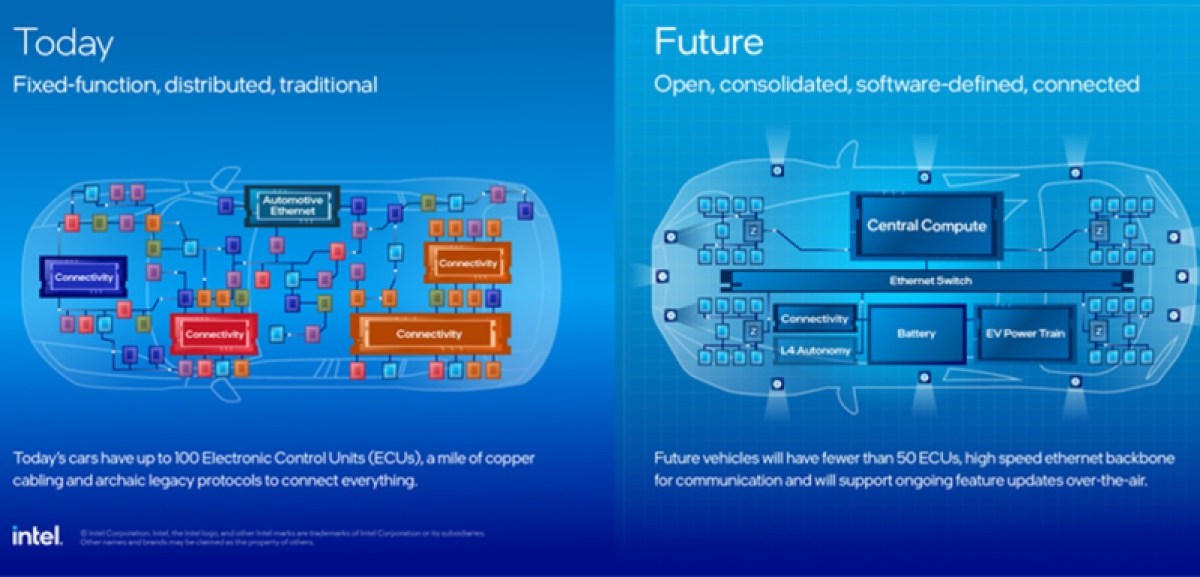Intel has acquired Silicon Mobility SAS, a portfolio company of Cipio Partners and Capital-E and a fabless
automotive silicon and software company that designs, develops and deploys EV energy
management SoCs.
Silicon Mobility’s SoCs feature industry-leading accelerators purpose-built for energy delivery and co-designed with highly advanced software algorithms for significant gains in vehicle energy efficiency.
Silicon Mobility’s technology portfolio will extend Intel’s reach in the vehicle beyond high-performance compute into intelligent and programmable power devices. The acquisition is subject to necessary approvals. And that’s not all.
In the era of the AI PC, Intel isn’t stopping at the desktop. The big chipmaker also wants to bring AI computing to software-defined cars.
VB Event
The AI Impact Tour
Getting to an AI Governance Blueprint – Request an invite for the Jan 10 event.
At CES 2024, Intel showcased how it wants to play a pivotal role in shaping the future of automotive intelligence. The tech giant introduced AI-driven advancements poised to change the automotive landscape, underscoring its commitment to realizing the potential of AI in all spheres of life.
Intel unveiled its first-generation Software-Defined Vehicle (SDV) system-on-chip (SoC), specifically engineered to infuse AI experiences into next-generation cars while giving car developers a say in exactly what kind of processing they want in a car.
“Today marks a significant milestone in our mission to embed AI in every facet of our lives,” said Jack Weast, vice president and general manager of Intel Automotive, in a statement. “Intel’s foray into automotive growth is spearheaded by our commitment to harness our extensive experience and product suite, streamlining the disruption sweeping across the automotive domain.”
In particular, Intel will give SoC customers are choice in what to include in the form of chiplets, or segments of a chip that can be mixed and matched based on customer intellectual property.
“No one has done software-defined vehicles right yet,” Weast said in a press briefing. “Sustainability is the focus. Batteries are now the most expensive and heaviest part of the vehicle. It reminds us of the first-generation laptops. They were not designed for energy efficiency. We have decades of experience in helping the industry get to a more sustainable future. We hear from automakers over and over that they need a scalable solution.”

The SDV SoCs unveiled by Intel signify a leap in delivering the power, scalability, and AI-driven performance that automakers demand, Weast said. These chips integrate AI acceleration capabilities from Intel’s AI PC roadmap, enabling a new realm of in-vehicle AI use cases.
Zeekr, an original equipment manufacturer (OEM), is already a customer of Nvidia. But Intel said the electric vehicle maker will also be the first to adopt Intel’s new SDV SoC in their forthcoming models. Leveraging this technology, Zeekr aims to infuse their next-generation vehicles with enhanced living room experiences, emphasizing forward-compatible Intel systems and AI acceleration capabilities to continually elevate customer experiences.
Intel’s said its sustainability and open innovation were reinforced through its collaboration with SAE International. Together, they announced the initiation of an industry-shaping standard for Electric Vehicle (EV) platform power management. This move draws from Intel’s decades-long expertise in PC energy management, aiming to make the all-electric future more sustainable while aiding OEMs in scaling across their vehicle portfolios.
Intel pledged to pioneer an open automotive chiplet platform, challenging the existing closed monolithic solutions prevalent in the industry. Teaming up with Imec, a research hub, Intel aims to liberate automakers from these constraints by advancing chiplet packaging technologies, ensuring reliability, and enabling the integration of customer chiplets into its automotive product roadmap.
The unveiling also showcased the transformative potential of Intel’s AI PC experience in automobiles. Demonstrating 12 advanced workloads concurrently – from generative AI to high-definition video conferencing and PC gaming – the platform showcased how automakers can consolidate their electronic control unit (ECU) architectures, delivering improved efficiency, manageability, and scalability.
While Intel acknowledged it is late to the connected car party (it was represented through Mobileye but it sold that business), the company believes its open and hybrid-custom AI-enabled automotive chiplet platform aims to drive efficiency, sustainability, and a more dynamic global supply chain. This vision fosters a future where industry standards lead to a more sustainable, energy-efficient, and scalable EV ecosystem, Intel said, and it may turn out to be an advantage with customers.
He noted that cars already have a mile of cabling in them and car makers can’t keep adding more electronic control units to vehicles. Batteries are now the heaviest and most expensive parts of the car.
“We are bringing the AI PC to the car, to that huge investment that Intel is making in a massive ecosystem push for ISVs and other vendors who are bringing differentiating experiences to that Intel AI PC platform — we are bringing that platform to the car,” Weast said.
Intel’s advancements in Vehicle Platform Power Management through SAE’s standards committee mark a pivotal step in promoting open standards within the industry. Drawing on the success of PC industry standards like ACPI, Intel aspires to lead the automotive sector toward greater sustainability, energy efficiency, and an efficient global EV supply chain, Intel said.
Another advantage now is that car makers have speed up their development cycles from five years to 18 months to two years. That means they can redesign and switch vendors more easily, something that favors challenges like Intel, Weast said.
He said that Intel’s first-generation AI software-defined vehicle system will be commercially shipping by the end of 2024 with Zeekr as the first customer.
GamesBeat’s creed when covering the game industry is “where passion meets business.” What does this mean? We want to tell you how the news matters to you — not just as a decision-maker at a game studio, but also as a fan of games. Whether you read our articles, listen to our podcasts, or watch our videos, GamesBeat will help you learn about the industry and enjoy engaging with it. Discover our Briefings.










